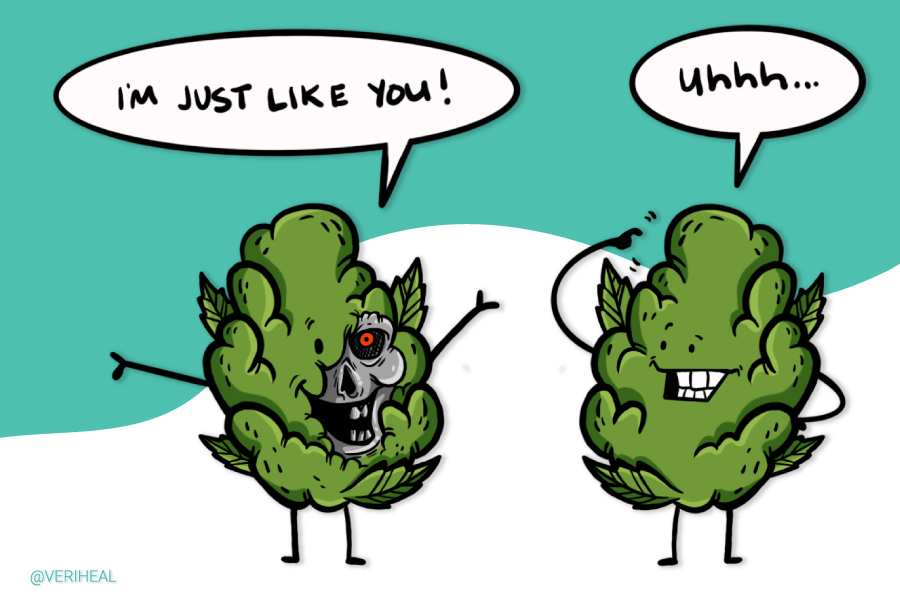In the last two years, the news in Washington D.C. has reported that cases involving overdoses related to a substance called “K2”, sometimes referred to as “Spice”, has increased by as much as 130% from the 3,488 cases brought forward in 2018. K2, or Spice, is a street drug made of synthetic cannabinoids, which studies have linked to serious health problems.
Spice is one of the names frequently attached to these synthetic cannabinoids, along with the name K2. The biggest difference between synthetic cannabinoids and the organic cannabinoid compounds from the cannabis plant, is that the synthetic version is made by spraying man-made chemicals onto dried plants. Immediately, we can see that the composition of K2 is not the same as the botanical composition of cannabis. The cannabis community needs to take extreme caution against the use of these synthetic cannabinoids, especially in light of the recent research which displays that it may induce psychosis.
K2 is often consumed for the same reasons as one might consume cannabis. K2 is also as easily accessible as cannabis BUT it does not show up in urine drug tests. This contributes to its appeal, when it should have none. K2 targets the same receptors in the brain which the organic cannabinoid compounds, such as tetrahydrocannabinol (THC) and cannabidiol (CBD), target too. However, Spice interacts with the receptors more intensely since the synthetic cannabinoids are more potent than the organic cannabinoids. It is also apparent that the synthetic cannabinoids bond to the receptors 4-5 times easier and more readily than the organic cannabinoids would.
Those differences may seem like something we would benefit from… however, professionals believe that those very differences are behind the adverse side-effects. Consuming K2, the synthetic cannabinoids, is linked to psychiatric problems, which includes psychosis.
Unlike Cannabis, K2 Is Often Associated with The Following Side Effects:
Mild:
- Agitation
- Irritability
- Anxiety
Severe:
- Seizures
- Bleeding
- Vomiting
- Strokes
- Elevated blood pressure
- Abnormalities in heart rhythm
- Chest Pain
- Kidney Failure
- Heart Attacks
- Mortality
Why Should You Exercise Extreme Caution:
Don’t take it just on our word… the following studies all show evidence that K2, or Spice, is a cause for alarm and that the adverse side-effects associated with its’ consumption can be severe. Thus, making synthetic cannabinoids best when avoided.
This study was published in 2019 and looks at how the “Spice” can induce psychosis in individuals who consume it. Psychosis is a condition that can (negatively) affect the way the brain processes information. The theory of the study is that Spice can induce psychosis due to its amplified affect on the cannabinoid receptors, which get depleted. K2 depletes the cannabinoid receptors much faster than the organic counterpart. This study is also one of more recent studies on K2 which been published. The researchers urge medical professionals, government agencies and the general public to “work together to mitigate these dangers”.
In 2011, Dr Young and her team published a study on the cardiotoxicity associated with K2. Cardiotoxicity is a condition where the heart muscles are damaged and can interrupt blood flow throughout the body. Keeping on the topic of the thing that gives us life, another study published in 2015 warns us again on the cardiovascular risk you put your heart in when you consume K2. Like the 2011 study, the 2015 study concluded with “more research is needed”. And just in case two studies warning people against K2 for the sake of our hearts, another study published in 2018 concluded with results that suggest K2 can boost the risk of experiencing strokes, especially in younger users.
Where Does K2 Come From?
When the cannabinoid receptors in the brain were discovered during the 1980’s, researchers began working on the creation of synthetic cannabinoids. The aim was to use the synthetic cannabinoids for studying how the cannabinoid receptors in the brain respond to cannabis cannabinoids such as THC.
In the late 1980’s and early 1990’s, John Huffman created the most popular synthetic cannabinoid compound which mimicked the effects of the organic THC cannabinoid. Mr. Huffman did not intend for the compound to become a black-market recreational drug. The first spikes of synthetic cannabinoid use was in Europe during the mid-2000’s, while the first spike in American use came in the early 2010’s.
Although K2 and Spice are the more common names used for the synthetic cannabinoids, it can also be sold in packages with names of “potpourri” or “herbal blend” and it is also referred to as Black Mamba and Scooby Snax. As cool as some of those names sound, it is in your best interest to avoid consuming synthetic cannabinoids since they’re man made with chemicals, linked to an increasing rate of overdoses and although more research is needed, the ones available display more than enough reason for avoiding it.
The botanical cannabis cannabinoids and terpenes are second to none and one of its’ kind. Do not cheat your body out of the real deal.
Author, Share & Comments
















